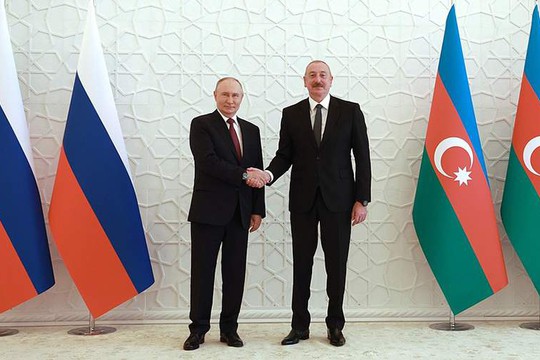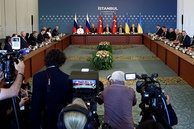Two weeks after President Vladimir Putin visited Baku on August 19, the media space continues to discuss the outcomes. In the course of the summit the Russian and Azerbaijani leaders focused on a variety of issues and signed a number of documents[1]: three treaties and three memorandums. Undoubtedly, the negotiating platform was far broader so the final estimate of the agreements will be provided only in the future. The most confidential issues (such as protection of bilateral trade, particularly in the gas sector, against US and EU sanctions) were discussed behind closed doors and, for clear reasons, were not talked about in public. Nevertheless, political analysts did draw some conclusions.
Issues on the agenda and their background
Most experts have come to the conclusions that the main point of the discussion was the gas issue. Azerbaijan’s and Turkey’s gas transportation infrastructure may partially alleviate Gazprom’s growing difficulties over the nearly complete loss of European market.
«An agreement could be signed on the supplies of Russian gas to Azerbaijan in exchange for an increase in exports of Azerbaijani gas to Europe. This means the Russian gas can be used for the internal market (of Azerbaijan – author’s notes)», — Azerbaijani political scientist Fuad Shakhbazov says[2]. In other words, Baku will transport its gas (to which Europe has no sanctions) to the EU via Russia and in return will get Russian gas, which it may possibly dispatch to Europe via the TANAP pipeline, (to which Europe has no claims either) through Turkey. Azerbaijan, under this so-called “swap” scheme, will get a chance to increase, as promised, the export of gas to Europe, despite limited opportunities to boost its production.
European media have long accused Baku of re-exporting Russian gas to Europe. However, given that the EU is economically interested in gas supplies from Azerbaijan, including via Ukraine, Brussels is turning a blind eye to the accusations and is de facto legitimizing[3] the re-export. At the end of the year, when the contract with Gazprom expires, Ukraine will have to conduct difficult but important-for-Europe talks about the transit of Azerbaijani natural gas. According to western experts, this means a lot to the Ukrainian economy, as the transit will be paid for, thereby covering the deficit of the Ukrainian gas system.
Supposedly, Azerbaijani gas supplies will match the volume (15 billion cubic meters) which Gazprom is still delivering via the last remaining leg of the pipeline across Ukraine into countries of Central Europe. To substantiate such agreements experts mention a statement by Gazprom President Alexei Miller to the effect that the Russian corporation and the Azerbaijani SOCAR have resolved to expand strategic partnership as part of the “North-South” Project. In addition, this summer they discussed at length the possibility of continuing to supply gas into Europe via Russia and Ukraine by replacing Russian gas with Azerbaijani. This was confirmed by both Azerbaijani President Ilham Aliyev and Ukrainian President Vladimir Zelensky[4].
However, «this option is possible only if Turkey gets Russian gas instead of Azerbaijani…. Ankara hopes that the gas hub will enable it to become a gas price center…It will thus continue to negotiate with Gazprom and BOTAS on the creation of the hub. Putin’s successful visit to Baku may facilitate Russian-Turkish talks»[5], - political scientist Georgy Bovt believes.
A key point on the agenda of Baku-Moscow talks is the development of International Transport Corridor (ITC) «North-South».
The participants in the Baku talks repeatedly underscored the importance of developing the transport corridor «North-South», which can connect saint-Petersburg with Indian sea ports. Already under way is the modernization of the railway section of the corridor for boosting the carrying capacity and transportation of cargoes of 15 – 30 million tons. Segments of the corridor – the railway and the motorway - «are fully implemented and are successfully functioning» in Azerbaijan, I.Aliyev assured[6].
There is also the possibility of a direct trans-modal haulage of cargoes via Russian and Iranian ports into the Caspian. However, this route has many drawbacks: it substantially loses to the land one in the speed of cargo delivery due to the under-developed port infrastructure on the Caspian. It will thus require a lot of effort to streamline the transit of cargoes in ports; to deepen river beds in order to make them more suitable for large-capacity vessels sailing through the Russian waters to the Caspian and then to the Iranian coast; to build a tanker fleet (the Russian and Azerbaijani leaders agreed[7] on a joint project to build modern river-sea tankers in the course of the official meeting in Baku).
Given that the former communication networks are blocked because of western sanctions, Russia has to look for new reliable ways to enter external markets. Azerbaijan, along with Armenia, provides a convenient land way across the territory of Transcaucasia to the Indian coast and the world markets bypassing European ports.
Under the Trilateral Statement of November 9, 2020[8] on the ceasefire in Nagorno-Karabakh, Armenia pledged to unblock transport communication between the western regions of the Azerbaijani Republic and the Nakhchivan Autonomous Republic, which became to be known as the Zangezur or Syunik corridor. This section was to be shared by the ITC “North-South”, the Trans-Caspian International Transport Route (TITR, or the Middle corridor)[9]. However, according to the Russian Foreign Minister S.Lavrov, under pressure from western curators and following the anti-Russian turnaround, the Armenian leadership «is sabotaging the agreement on unblocking communications across the Syunik Province»[10].
The West is opposed to the fact that control over transport communication, under the Trilateral Statement, should be carried out by the Border Service of the Russian Federal Security Service. The USA has its own plans for the Armenian section of communications for controlling and possibly blocking the trade routes, both the Middle corridor and the “North-South”, since the main goal of the western vector in the South Caucasus is to oust Russians and Iranians from the region and to prevent the strengthening of the Chinese.
Addressing the July hearings in the US Senate a State Department representative said that a peace treaty between Yerevan and Baku should envisage a route between Azerbaijan and Nakhchivan only across Armenia and under the control of Armenia (read the USA), and not the Russian Border Service[11]. Moreover, the USA openly threatens Azerbaijan in case of disobedience: «A transport corridor which will be created in a different way [that is, NOT via the territory of Armenia - author], with use of force or with the participation of Iran, will face a decisive response»[12].
Azerbaijan, however, is currently against the American project of the Armenian section, as, in the opinion of Azerbaijani leaders, its logistics are designed to make Azerbaijan dependent on Armenia[13].
Baku passed a pragmatic decision in August excluding from the text of the draft treaty the mention of the disputable Zangezur corridor, which is a stumbling block in negotiations with Yerevan. As a result, Armenia has lost a trump card in the negotiating process and risks finding itself in complete transport isolation, which results from political narrow-mindedness and refusal to cooperate with key players in the region. Now, the ITC “North-South” and the Middle corridor will pass via Azerbaijan directly to Iran, bypassing Armenia. In the future, the “North-South” transport corridor may incorporate a strategic export pipeline route to Iran and via the territory of the Islamic republic further to India, and to the key countries of Asia and Pacific Region as well.
Under the new agreement with Gazprom, Iran plans to get up to 300 million cubic meters of pipeline gas from Russia per day or nearly 110 billion cubic meters per year (the volumes comparable to those which could be provided by both blown-up Nord Streams taken together). A statement to this effect was made on July 17 by Iranian Shana and IRNA[14] quoting Oil Minister Javad Owji. It seems that Iran is planning to create a similar hub of Russian gas as Turkey, only not in the west but in the south and south-east.
In this respect, if it wants to promote its economic interests, Azerbaijan should participate in Eurasian economic projects, within SCO and BRICS. If Azerbaijan enters BRICS, the western (in relation to the Caspian Sea) part of the routes will pass solely across the territories of member countries. In this case, Azerbaijan may benefit from opening a land route with Nakhchivan and Turkey not via Armenia but via Iran, which will become a good economic partner within BRICS. Russia is actively involved in promoting understanding between Baku and Tehran. As a result, Iranians and Azerbaijanis are establishing inter-government infrastructure by building bridges and a motorway which will guarantee access to Turkish and European markets.
Azerbaijan’s bid for membership in BRICS shortly after Putin’s visit is a serious move in Baku’s foreign policy, which traditionally stays away from any geopolitical blocs. Meanwhile, membership in BRICS does not entail any military or political commitments. This seems to be the reason why Azerbaijani authorities chose to do so.
The participants in the Baku talks also focused on a peace settlement between Armenia and Azerbaijan. Russia called for restoring the role of an effective mediator in this peacemaking process. There has been some progress to this end.
Armenia’s Prime Minister Nikol Pashinyan, having been informed by the Russian president on the discussions in Baku, has agreed to meet with Vladimir Putin for «negotiating bilateral issues».
In the course of a telephone conversation between Russian President Vladimir Putin and Azerbaijani President Ilham Aliyev on August 28, the two leaders pointed out that they «continued to discuss various aspects of the current situation in Transcaucasia, including preparations of an Azerbaijani-Armenian peace treaty, delimitation and demarcation of the border, and unblocking transport communications between the two countries. They also agreed to continue personal contacts»[15].
Foreign media on results of V.V.Putin’s visit to Baku
The news agency «Bloomberg» reports that the EU is in search of alternatives for the transit of Russian gas across Ukraine, considering the Azerbaijani variant as the first option. «This could become shocking news for everyone who is not related to the energy sector: Europe continues to buy Russian natural gas, including via a pipeline that passes across Ukraine. Austria, Slovakia, Hungary and Italy are still strongly dependent on gas from Moscow»[16]. According to «Bloomberg» experts, if Ukraine blocks this pipeline too, the current European reserves will not be enough, gas prices will soar again, even though they have already doubled as compared to the rates before the Special Military Operation. High prices will put yet more restrictions on the energy-intensive industrial activity in Europe.
The Ukrainian media[17] immediately put Azerbaijan on the list of «foes of Ukrainian independence» and called for sanctions against the Azerbaijani company SOCAR, after the Russian company Gazprom announced a strategic partnership with SOCAR.
«In two years of a full-scale war European consumers have added to the budget of the Russian war against Ukraine by purchasing Russian gas to a total sum of 88.8 billion euros. After the termination of this contract there appears a new threat – supplies of gas via Ukraine as Azerbaijani gas which in reality could turn out to be Russian gas»[18], - Victoria Voytsitska, a member of the Energy Committee in the Ukrainian Parliament, writes in horror. She attempts to debate with «Bloomberg»: «arguments that Europe is experiencing tremendous gas shortages do not match the reality, ……they are part of propaganda». But it looks like Europe sticks to a different view on the issue.
Columnist for Al Jazeera Jeirar Dib believes[19] that Putin’s visit to Baku has challenged the United States, which has big plans for the Caucasus. According to the observer, the USA is willing to cement its presence in the Caspian because its location is of strategic importance and it is rich in energy sources, particularly natural gas. Moreover, Washington is planning to strike at the Chinese «One Belt One Road» Initiative and set Azerbaijan against Iran. In the estimates of the author of the article, Moscow key agenda in the region includes the following: to resolve the gas issue, alleviate tension between Baku and Tehran and counteract Washington’s interests. He underscores that Putin has good chances to «thwart US attempts to take a foothold in South Caucasus».
Baku has become Moscow’s major partner in South Caucasus, Al Mayadeen[20] writes. The Russian leader is trying to prevent the West’s interference in the region and is pursuing his projects — to create transport corridor «North-South», to conclude agreements on energy and trade. Putin’s visit to Azerbaijan is a signal to the West that Ukraine is not distracting Russia from following its interests in Transcaucasia. Moscow will not waive its role in this region. It can move along the corridor «North – South» at the closed «western gates» and can easily break through the geopolitical blockade which is being imposed by the West.
Turkish analyst Mehmet Ali Guller, commenting on the importance of the Russian president’s visit to Baku, expressed[21] confidence that the results off Azerbaijani-Russian top-level talks will influence not only the situation in the region but the entire Eurasian space. In response to the US policy, a number of powers, including Russia and China, are developing their own concepts of trade routes in Eurasia. Moscow is set on destroying the West’s plans to create transport corridors bypassing Russia. This is what «North-South» corridor is for.
Passions are running high in the Armenian pro-government media space following Vladimir Putin’s visit to Baku. Many Armenian commentators, keeping mum on the fact that the Armenian authorities have de facto distanced themselves from a dialogue with Russia, accuse[22] Moscow of betraying Armenian interests. Such a reaction serves as yet another proof of a complete loss of orientation and cause-result logic in the Armenian society.
However, there remain sober-minded analysts in Armenia. Armenian political scientist Suren Surenyants disagrees with experts who describe Putin’s visit to Baku as «anti-Armenian conspiracy». He believes that dialogue between Moscow and Baku facilitates stability in South Caucasus.
Conclusion
On the whole, according to experts, the visit to Azerbaijan demonstrates that Russia is not going to leave the region. On the contrary, Putin proved that Moscow is strengthening its positions in South Caucasus, the West’s attempts to isolate Russia from the rest of the world have failed. Aliyev demonstrated to neighboring republics that good ties with Russia guarantee economic prosperity, stability and geopolitical independence. Azerbaijan, which pursues the policy of healthy pragmatism and mutual benefit, has become a natural ally and partner for Russia amid the policies of the Pashinyan government.
In foreign policy, Azerbaijan has got down to establishing contacts with regional allies besides the Ankara – Baku axis. For Azerbaijan, closer ties with Russia mean a wider geopolitical space. Aliyev needs strong allies, such as Russia and China, to contain pressure from the West. Due to efforts by President Ilham Aliyev, sovereign Azerbaijan has a sense of responsibility and is oriented at mutually beneficial cooperation, and, unlike a number of post-Soviet republics, has not turned into an area of confrontation between the West and Russia. Moreover, Aliyev has proved that he responds to Western pressure accordingly[23] thereby suggesting that he has joined the club of sovereign national leaders.
Russian leadership has thoroughly observed parity with regard to the interests of Armenia and Azerbaijan, including on the issue of the unrecognized Karabakh republic. However, Pashinyan nullified the 2020 Trilateral Statement with the “Prague betrayal” of Karabakh in October 2022.
Armenia’s drift towards the West caused Moscow to perceive Baku as a more trustworthy partner in the region.
At present, political and economic interests of the two countries coincide. Azerbaijan is interested in implementing all strategic and economic projects, necessary for Russia’s breakthrough into the South and South-East.
The views of the author are his own and may differ from the position of the Editorial Board.
[1] http://kremlin.ru/supplement/6178
[2] centralasia.media/news:2150134?f=cp
[3] https://turan.az/ru/politika/eksperty-vydvigaiut-raznye-versii-otnositelno-vizita-putina-v-baku-783688?ysclid=m04afk8qy9480406451
[4] https://haqqin.az/news/321094
[5] https://invoicemedia.ru/glavnym-v-hode-vizita-vladimira-putina-v-azerbajdzhan-byl-gazovyj-vopros/?ysclid=m04bcpns6r959249866
[6] https://ria.ru/20240819/proekt-1967089897.html
[7] https://www.kommersant.ru/doc/6905438
[8] http://kremlin.ru/events/president/news/64384
[9] TITR – transit route between China and Europe via Kazakhstan (alternative routes include Central Asian countries: Kyrgyzstan, Uzbekistan, Turkmenistan), Azerbaijan, Georgia, Turkey, and the Black and Caspian Seas. TITR is based on the TRACECA initiative, popular in the 1990s.
[10] https://ria.ru/20240819/lavrov-1967128742.html
[11] https://interaffairs.ru/news/show/47226
[12] https://www.youtube.com/watch?v=EuEhHnwTlAg&t=2s The Future of Nagorno-Karabakh - YouTube
[13] https://vesti.az/politika/obraien-i-armeniya-novye-soyuzy-i-starye-protivoreciya-analitika-518870
[14] https://ru.irna.ir/news/85541550/%D0%9D%D0%BE%D0%B2%D1%8B%D0%B5-%D0%B4%D0%B5%D1%82%D0%B0%D0%BB%D0%B8-%D1%81%D0%BE%D0%B3%D0%BB%D0%B0%D1%88%D0%B5%D0%BD%D0%B8%D1%8F-%D0%BE-%D0%BF%D0%BE%D1%81%D1%82%D0%B0%D0%B2%D0%BA%D0%B5-%D1%80%D0%BE%D1%81%D1%81%D0%B8%D0%B9%D1%81%D0%BA%D0%BE%D0%B3%D0%BE-%D0%B3%D0%B0%D0%B7%D0%B0-%D0%B2-%D0%98%D1%80%D0%B0%D0%BD
[15] https://www.interfax.ru/russia/978477
[16] https://www.bloomberg.com/opinion/articles/2024-08-27/european-energy-in-the-gas-market-enough-may-not-be-enough
[17] Ukraine in a circle of foes. Kyiv’s reaction to Vladimir Putin’s visit to Baku - 22.08.2024 Ukraina.ru
[18] https://www.yahoo.com/news/azerbaijani-gas-ukraine-hidden-russian-131009512.html
[19] https://www.aljazeera.net/opinions/2024/8/19/%D9%87%D9%84-%D8%A8%D9%88%D8%AA%D9%8A%D9%86-%D9%81%D9%8A-%D8%A3%D8%B0%D8%B1%D8%A8%D9%8A%D8%AC%D8%A7%D9%86-%D9%84%D9%85%D9%86%D8%B9-%D8%AD%D8%AF%D9%88%D8%AB-%D8%AB%D8%BA%D8%B1%D8%A9
[20] Аl Mayadeen (Arabic: الميادين, transl. "Squares") – Lebanese pan-Arabist satellite news TV channel, based in Beirut. In the pan-Arabic television news market it competes with Qatar’s Al Jazeera and Saudi Al Arabiya, and also with Sky News Arabia and BBC News Arabic
[21] https://azertag.az/ru/xeber/tureckii_ekspert_itogi_vizita_putina_v_baku_skazhutsya_na_situacii_vo_vsei_evrazii-3149138
[22] https://radar.am/ru/news/interview-2648114272/
[23] https://interaffairs.ru/news/show/47226
read more in our Telegram-channel https://t.me/The_International_Affairs

 12:25 02.09.2024 •
12:25 02.09.2024 •

























